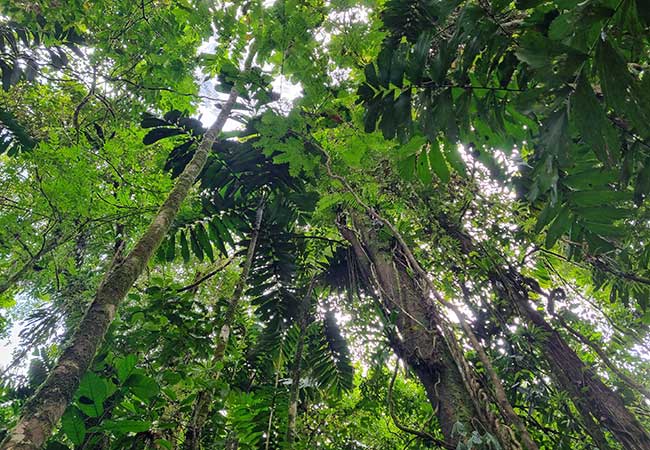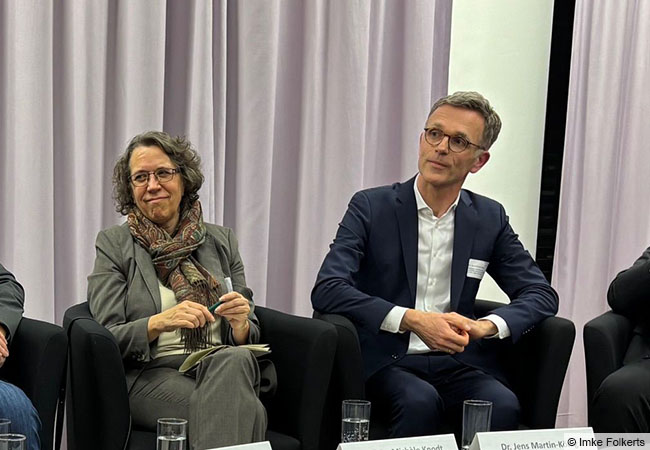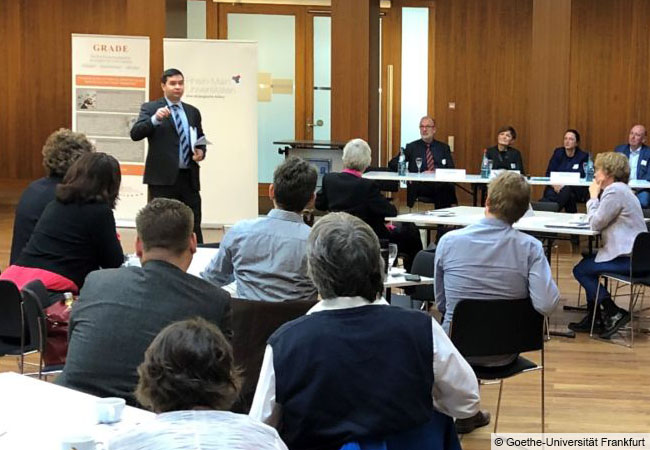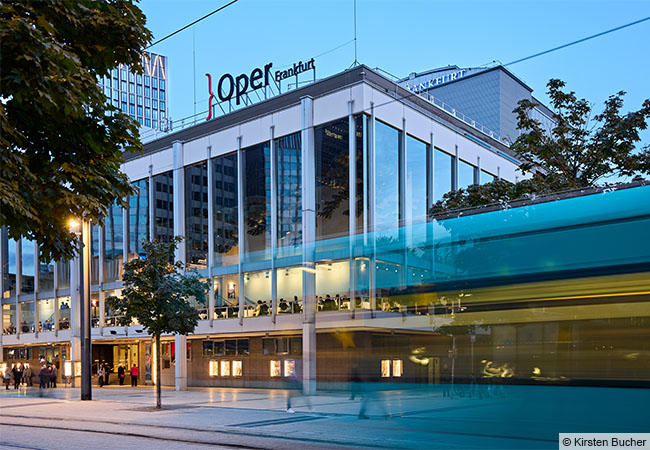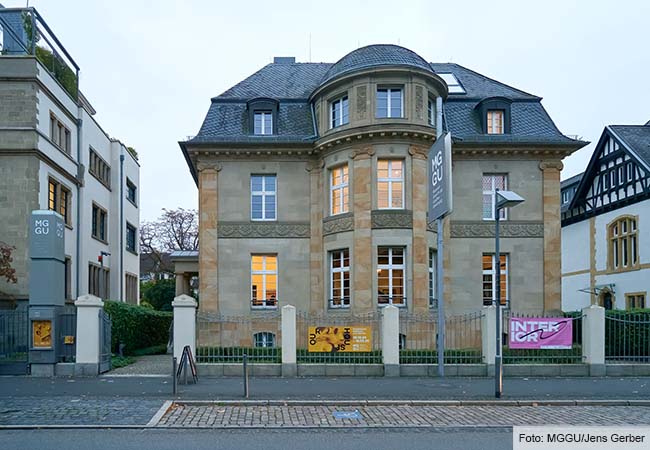From Stanford to Jerusalem, Ibadan to Iğdır, and Grenoble to Tel Aviv: The latest recipients of the Goethe Research Experience Program scholarship are as diverse as their research subjects.
What do Langston Hughes’ writings about 1930s Mexico, the experiences of the Huguenots who settled in Frankfurt in the 16th century, the role played by religion, trust and identity in this year’s Nigerian elections, and the 3,000-year-old findings unearthed at the Lyrbe excavation site in Turkey have in common?
Probably not very much, although, truth be told, a profounder answer would definitely require more serious scientific contemplation. Notwithstanding the results of that analysis, on November 24, 2023, these four entirely different subject matters and the bright minds behind them captivated participants at the Goethe Research Experience Program’s (GREP) winter semester 2023/24 reception, held at Goethe University Guesthouse.
Launched in October 2022, GREP is directed at outstanding international undergraduate and master students, who – if their application is successful – spend two to six months at Goethe University Frankfurt as part of a research stay that includes free accommodation and access to university facilities. During that time, they can either work on their thesis or dissertation, or complete a laboratory internship. This winter semester, four students from came to Goethe University as part of GREP. They are Alan Burnett Valverde of Stanford University (USA), Shukurat Titilola of the University of Ibadan (Nigeria), Veli Kaya of Iğdır University (Turkey) and Chiara Dainche of the Université Grenoble Alpes (France). They follow on the heels of two other fellows from Israel, Yuli Ketain Meiri of the Hebrew University of Jerusalem and George Atmeh of Tel Aviv University, who completed their research stays in the 2023 summer semester. You can read more about their GREP experience here.
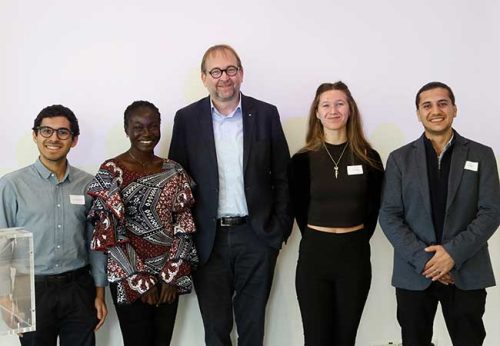
Welcoming the four scholars, Goethe University President Prof. Enrico Schleiff pointed to GREP’s success to date: “These initiatives not only show the great potential in creating long-lasting research collaborations. I also believe that given our current geopolitical crises, scientific dialog and knowledge exchange are becoming an ever more important means of fostering transnational understanding and building trust. We need future generations of researchers, like our four GREP fellows gathered here today, who will push the boundaries of knowledge and challenge established paradigms and ideas.”
Before giving the floor to Leonora Jürgens GREP Program Manager at Goethe University, who successively introduced the scholars, their sponsors, and their research topics, Schleiff addressed the four scholars: “You were nominated because of your outstanding academic performances and high research ambitions and I would personally like to congratulate you on this great achievement! Your decision to participate in the program not only reflects your own dedication to scholarly pursuits but enriches our academic community and strengthens our collective ability to better understand and address important questions of our time.”
Alan Burnett Valverde
MA Student at Stanford University, USA
Duration of research stay at Goethe University: 2 months
Sponsor: Prof. Johannes Völz, Institute of England and America Studies (IEAS), Faculty of Modern Languages
Research field: American Literature
Research focus: Literary exchanges between the United States and Mexico during the late 19th and early 20th centuries.
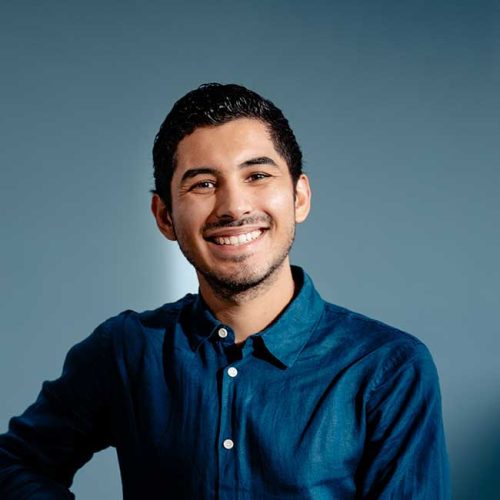
“I concentrate on the myriad ways in which US American artists and intellectuals from the political left grappled with the Mexican Revolution (1910-1920), its immediate political aftermath, and the Mexican cultural ‘renaissance’ that emerged during the ‘20s and ‘30s,” Alan Burnett Valverde says of his research. As part of this focus on multi-racial, trans-American literature of leftist traditions, the Stanford University Master’s student is particularly interested in the work of writers and activists like John Reed, John Dos Passos, and Langston Hughes, all of whom, he says, emphasized Mexicans’ distrust of the United States and their constant fear of military intervention during that time.
Speaking at the GREP reception, Burnett Valverde, who is bilingual in English and Spanish, presented his current research, titled “Made in Mexico: Langston Hughes’ ‘Troubled Lands’”. Not only is he looking at Langston Hughes’ unpublished anthology of translations of Mexican short stories, compiled in 1935. His research also ties in records that trace the creation and demise of the collected works, including pages written in Hughes neat handwriting containing the translations of Spanish terms into English – a private dictionary and learning aid inspired by “Dox Quixote”, the literature Hughes’ Spanish teacher Profesora Esperanza Aguilar had set him upon to learn.
What drew him to Goethe University, Burnett Valverde says, is the “ConTrust” cluster initiative – “and the possibility of investigating new ways of thinking about the role of media in the cultivation of public trust and the mediation of political conflict,” specifically with a view to how questions of (dis)trust were negotiated in US-Mexican literature and news media. In addition to the literary deep dives he has taken, he is also investigating new forms of media that emerged during the first decades of the 20th century, and the ways in which they were mobilized for geopolitical motives. “For instance, I am interested in thinking about the newsreel as an emergent form of (political) media during the 1910s.” At Goethe University and within ConTrust, Burnett Valverde told the audience, he has found “the ideal place to search for answers on these topics.”
Shukurat Adeola Titilola
MA Student at the University of Ibadan, Nigeria
Duration of research stay at Goethe University: 5 months
Sponsor: PD Dr. Pavan Malreddy, Institute of England and America Studies (IEAS), Faculty of Modern Languages
Research field: English Literature
Research focus: Religion, trust and identity in Nigerian politics
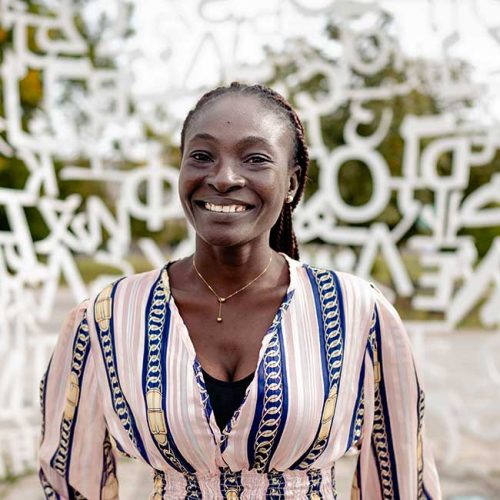
What role does (dis)trust play in Nigerian politics, and how does it tie in with religious and ethnic identities in the multi-religious and multi-ethnic West African country? Shukurat Titilola’s research focuses on how Nigeria’s youth in particular responded to the 2023 election. In taking a closer look at literary works and social media discourses addressing the impact of religion and identity on (dis)trust in the electoral processes, the central question occupying her is the role fiction serves in correcting the country’s political narratives and processes.
Specifically, Shukurat Titilola looks at the works of young Nigerian writers and artists, including Elnathan John, author of “Becoming Nigerian: A Guide”. The novelist, satirist and lawyer calls attention to how religion is used by the political elite: “A Nigerian politician must understand how to tap into and use God, both in times of peace and times of trouble”. In addition to social media and literature, the Master’s student from Ibadan University, who works as a part-time lecturer at the Federal College of Education and as a teacher with the Oyo State Teaching Service Commission, also researches other media, where “fact and fiction” are mixed. Another example she introduced to the GREP reception audience was artists’ Falz & Vector’s “Yakubu” music video, accusing Mahmood Yakubu, chairman of Nigeria’s Independent National Electoral Commission, of being a fraudster. In it, the artists take on two roles: Falz as a policeman and Vector as Yakubu’s purported lawyer.
As for her motivation to join GREP, Adeola Titilola says: “I believe this program is the next stage and the best opportunity for me, as it will avail me with international educational and research experience which will come in handy during my career.” She would like to pursue a doctorate in African Studies and later work in academia: “My ultimate aim is to be a distinguished professor whose works will cut across disciplines to provide relevant literature and doctor age-long societal ills.”
Veli Kaya
MA Student at Iğdır University, Turkey
Duration of research stay at Goethe University: 5 months
Sponsor: Prof. Dr. Anja Klöckner and Dr. Işıl Işıklıkaya-Laubscher, Institute of Archaeological Sciences, Faculty of Linguistics, Cultures and Arts
Research field: Archaeology
Research focus: Agricultural production in Asia Minor: A case study from Lyrbe”
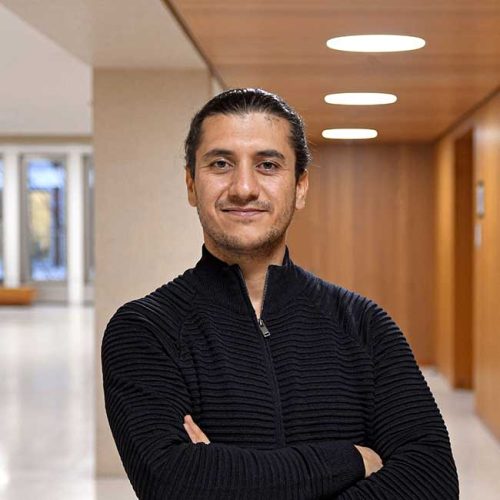
To Veli Kaya, the GREP fellowship means he can deepen his knowledge of the German school of archaeology, which he encountered at several excavations in his home country. The Master’s student from Iğdır University has been working on different archaeological sites at Kırşehir Castle, Epiphaneia, Lyrbe and Iasos since 2015 – where remnants dating back to the Early Bronze Age, some 3000 years BC, have been found.
Having started as a trainee, Veli Kaya successively complemented his field experience with architectural drawing, computer skills and languages, and has been working as field coordinator at the Iasos excavation project since October 2022. During his five months at Goethe University, he will be focusing on the architectural and archaeological remains of the excavation site in Lyrbe, southern Turkey. It is at this former Greco-Roman city where he met his sponsor’s colleague, Dr. Işıl IşıkIıkaya-Laubscher of Goethe University’s Institute for Archaeological Sciences, who led an archaeological survey there. “Many open questions remain about Lyrbe, including its size and purpose,” Veli Kaya said during the GREP reception, where he showed the audience pictures of some of the finds, including an ancient olive oil press and wine-making equipment. The main takeaway he hopes to gain from his time in Frankfurt is to learn more about the German school of archaeology’s “clear structure, comprehensive analysis, and interpretive approach, and experience the German work discipline and understanding in its own setting.”
Chiara Dainche
MA Student at Université Grenoble Alpes, France
Duration of research stay at Goethe University: 2 months
Sponsor: Prof. Dr. Xenia von Tippelskirch, Dynamics in Religion (focus on France), Faculty of Philosophy and History
Research field: History
Research focus: The French Reformed Church of Frankfurt (1561 – 1576)
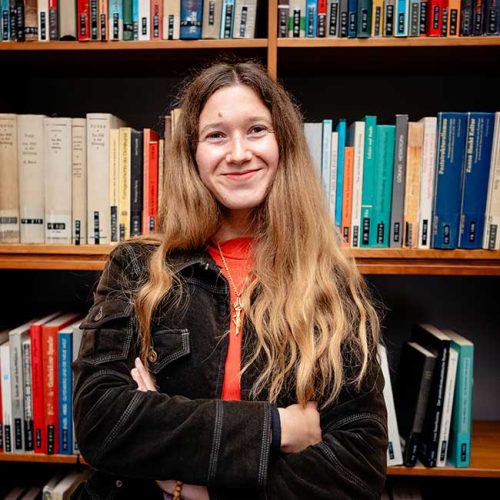
For Chiara Dainche, the two-month GREP research is essential to her Master’s studies, since it gives her the opportunity to access files in the City of Frankfurt’s Archives that are relevant to her research subject. Introducing her focus, she told the GREP reception audience that while the term “migrant crisis” is currently en vogue across Europe and elsewhere, in fact, migration was already an issue in the 16th century.
Fleeing persecution in France – with the St. Bartholomew’s Day massacre marking a pinnacle – members of the reformed French Church also found their way to Frankfurt. During the period Chiara Dainche is focusing on, their community consisted of some 2,000 people, accounting for roughly 10% of Frankfurt’s entire population at the time. “My research aims to reveal the specificities of the various experiences 16th century religious refugees had to face during their time in exile, including the way communities organized themselves to provide support to the newcomers, their interactions with the local authorities, the privileges they were granted and the way they faced specific issues related to their foreignness.”
At Frankfurt City Archive, Chiara Dainche is looking through the records of Frankfurt’s “Französisch-Reformierte Gemeinde”, specifically for logs of the church’s revenues and expenditures, spanning the period between 1554 and 1576. This information not only sheds light on inner-church operations as well as the community’s interactions with other municipal bodies, she says. More than that, the records also contain names, making it easier to trace the roles community members took on after the church was closed down in 1561 and community life moved into the private realm. This is a question she finds particularly intriguing: How can a foreign church continue to survive even after its closure? Whether in the form of receipts for schools or French teachers; records of treatments for those afflicted by the Plague; written exchanges with other communities in Frankfurt, wider Germany and the Flemish region; or records of onward migration to other communities in Schönau and Straßbourg – her findings have provided Chiara Dainche with a treasure trove, and a lot more avenues for further research endeavors.
For further information on the Goethe Research Experience Program (GREP), visit: www.goethe.link/grep
To find out more about research at Goethe University, visit: www.goethe-university-frankfurt.de/118903280/Research_at_Goethe_University


